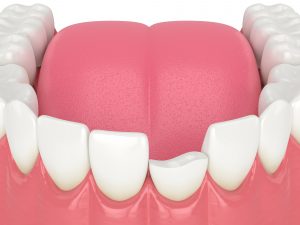 A chipped or broken tooth can occur for several reasons including a blow to the face, falling, or biting down on something hard.
A chipped or broken tooth can occur for several reasons including a blow to the face, falling, or biting down on something hard.
The damage to your tooth can be slight or severe, and you should see a dentist for an examination and treatment. You should never attempt to fix a chipped or broken tooth on your own, doing so may cause further damage or infection.
Before heading to your dental appointment there are a few things you can do to care for your tooth and alleviate symptoms. This includes:
- Not chewing with the affected tooth
- Flossing or rinsing to get rid of particles that may aggravate the injury
- Temporarily covering the tooth with sugarless chewing gum or dental wax. Temporary broken tooth repair kits are also available in most drug stores
- Taking over-the-counter pain relievers
- Only eating soft foods
There are a variety of ways to treat broken or chipped teeth. They include:
- Bonding
- Tooth reattachment
- Porcelain veneers
- Dental onlays
- Dental crowns and caps
- Root canal
Keep in mind, the sooner you receive treatment the better. Early treatment can reduce the risk of several dental problems.
To schedule an appointment with a dentist at Flushing Hospital Medical Center, please call (718) 670-5521.
All content of this newsletter is intended for general information purposes only and is not intended or implied to be a substitute for professional medical advice, diagnosis or treatment. Please consult a medical professional before adopting any of the suggestions on this page. You must never disregard professional medical advice or delay seeking medical treatment based upon any content of this newsletter. PROMPTLY CONSULT YOUR PHYSICIAN OR CALL 911 IF YOU BELIEVE YOU HAVE A MEDICAL EMERGENCY.



